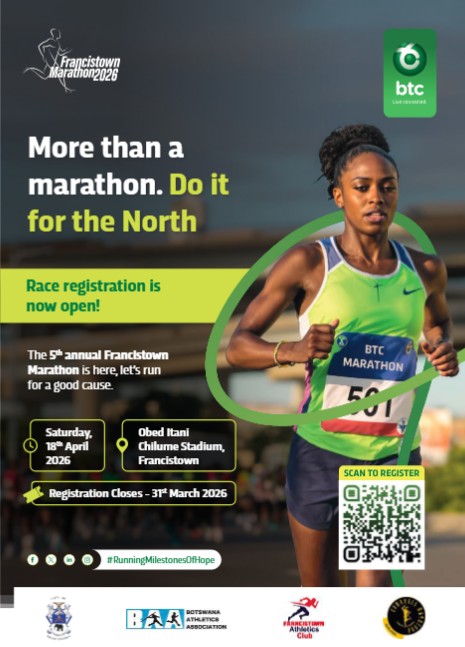Unless you are a past pupil or close acquaintance, the name Edwin Morolong is unlikely to ring any bells.
However, mention his pseudonym Pero and you are sure to get a reaction in wildlife and conservation circles.
The 39-year-old teacher-cum-photographer is the driving force behind Pero Photography, a company that specializes in wildlife pictures and boasts both a local and international following.
A proud conservationist, Morolong spends much of his spare time in the bush, expertly capturing the best images nature has to offer with his lens.
Through the week, the self-taught photographer can be found at Matlapana Primary School in Maun where he inspires young minds through his teaching.
Originally from Serowe, Morolong recently started a non-profit organisation, to help unemployed youth venture into his brand of photography.
Pero speaks to FRANCINAH BAAITSE about his passion.
Q. So how exactly did your photography side-hustle come about?
I started as a wedding and portrait photographer but due to the saturation of the market and unreliable clients, I diverted to wildlife and conservation photography. I have achieved a lot since I moved into the latter.
Q. And when did this transition take place?
In 2017 and I am happy with the progress I have made so far.
The idea is to help the government’s effort in addressing conservation issues through the use of photography.
I am hoping that once our society is inspired by the photos we take they will become educated and eventually come on board to conserve our natural resources.
Q. You say you’ve achieved a lot, please elaborate?
There are two things I have achieved under wildlife photography.
In 2018 I was invited to speak at the Wild Shots Wildlife Photography Symposium in Cape Town, South Africa, being the third Motswana to address the symposium.
The two previous speakers are my role models in wildlife photography: Ona Basimane and Lets Kamogelo.
At the same symposium, I had the opportunity to be in the company of a renowned photographer, one of my role models, Dennis Smith. He is also a local guide.
Under conservation photography, I have started a conservation society that will use photography as a medium to relay conservation messages, targeting out-of-school youth around wildlife protection areas with possible roll out to other places in the future.
I am so pleased with the response I am getting locally, regionally, and internationally.
Q. Wow, impressive stuff! So, how will the programme work?
Our target group is the youth in-and-around wildlife protection areas who are most disadvantaged in getting employment due to various factors.
The program is going to empower them with photographic skills through selling pictures.
Some of them will become photo hosts in safari companies. Similarly, we are going to merge their indigenous knowledge of conservation with modern ones and will come up with a much better way for them to help conserve natural resources in their areas.
Further, at the end of each session learners will be able to use skills learned to take care of the environment, equipped with business skills so they can run their own photographic safari companies.
This is because we will adopt a hands-on approach and as such the program is wide open for all stakeholders to come on board to address issues of conservation. We want to give conservation in Botswana a new dimension.
Q. Talking about the end of each session, does the program have semesters?
It will be a programme that will be running for a year per group.
At the end of each session, we are going to have an exhibition where we will be showing the best pictures taken by the participants during the training.
Q. It sounds like a commendable initiative; but does photography pay?
Yes, it pays and it is possible for one to make a comfortable living out of it.

Q. Considering your obvious passion for photography, how did you end up teaching?
My passion for photography started when I was in senior secondary school.
When I finished my secondary education I had a dream of becoming a journalist.
I was admitted to one institution in Gaborone to study journalism.
Unfortunately, by the time we completed the course we were told it was not accredited.
That really frustrated me because my dream of becoming a journalist was dashed just like that.
I ended up opting for teaching with advice from my senior secondary school teachers.
Q. Like all jobs, photography has its own challenges. Have you encountered any so far?
The biggest challenge I always have is to be at a particular place at a particular time.
We suffered greatly during the first national lockdown last year.
We were denied permits because we were not from any recognized media house; many memories worth capturing were lost.
The other challenge is that local-based government and private entities are reluctant to outsource photography services from local photographers and instead give the business to those based in Gaborone.
They leave us without jobs, yet we are capable just like those from the city.
Another challenge is the lack of reliable equipment dealers and repair services of camera equipment.
We source the services mostly from South Africa.
Q. As well as your demanding profession and passion for photography, I understand you’re also a family man. How do you find time to balance all three?
It is all about making sacrifices for all these.
I make sure none is suffering because of the other.
I usually have time for photography on weekends coupled with a bit of traveling.
I am happy that my partner is in media and she is so understanding and supportive.
Q. Tell, us more about your partner, how did you meet for instance?
She is the Creative and Content Director for Pero Photography.
I met her during the 2016 Mascom Derby right here in Maun and the rest of the story will be shared during our wedding day.
We have two children together, a boy and a girl.
Q. Congratulations. Back to your professional career, do you enjoy teaching?
Honestly, I used to enjoy being a teacher but recently, due to some changes in the system, I lost interest because it is no longer challenging but rather it is frustrating.
I guess my days in the profession are numbered!
Q. What are the challenges that come with being a male teacher in a primary school?
The first challenge is acceptance from society.
Our society is so stereotyped that it believes there are certain job cadres that should be taken by a certain gender.
But being a primary school teacher has built my patience levels because we are dealing with kids from diverse backgrounds.
Mostly we meet these children in their formative development stage, unlike our secondary school counterparts.
Q. How do you deal with Biology lessons, which cover topics such as menstruation, proper use of sanitary pads, and matters of sexuality?
By nature as Batswana, issues of sexuality are never freely discussed in our society and some parents have left all that as a responsibility of teachers.
I do try my best in most topics and where I feel I am not competent enough I will call one of my colleagues to take on the lesson.
I used to have a problem teaching the HIV/AIDS topic for I felt it made those on treatment uncomfortable and it felt as though I was somehow exposing them to the whole class so I would therefore skip the topic every now and then.
Q. You must have countless memorable moments from class over the years, do you mind sharing some of them with us?
I have a lot of interesting and sad incidents as a teacher but the one I won’t forget happened in 2014.
I was teaching about planets like the syllabus states that there are nine planets.
This other student, Joshua, raised his hand to tell me that according to a television program he watched on Discovery Channel, planet Pluto is said to have crashed and disappeared and a new planet has been discovered.
Upon checking his story from the Internet I found that indeed it is true what he said. But it’s almost seven years now, that information has not been updated in the syllabus unfortunately and we still teach children that Pluto exists.
Q. What about your own childhood memory, what did you enjoy as a young boy?
I used to enjoy going to the cattle post during school vacations but these days my weekends and holidays are for photography.
I hardly have time to go there anymore.
My late uncle nicknamed me Pero and later on my photography company is called Pero Photography.
This is an honor to him and his spirit will forever live with us.
Q. Anything else you’d like to add?
My dream is to see our country moving from workshop-based conservation education to a hands-on approach to conservation involving communities and stakeholders.
Conservation is the next big thing that we can take pride in as Botswana.
I also dream of seeing our society reaching out to as many youth and Botswana as possible.
Q. Finally, Thank God It’s Friday, what are you up to this weekend?
We are planning to go on a boat cruise and catch up with some friends.















